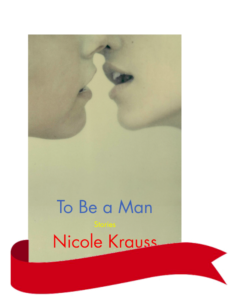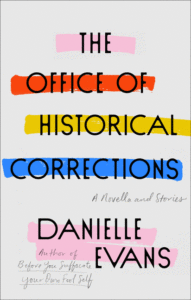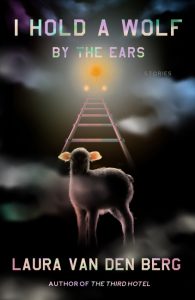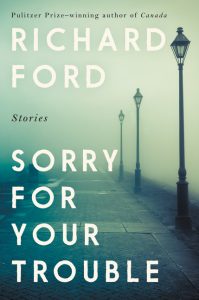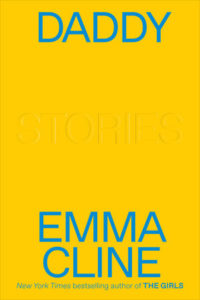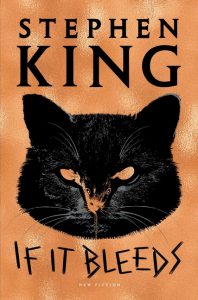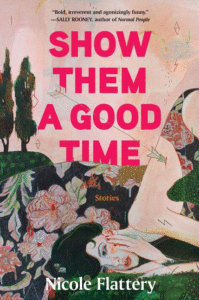
The Best Reviewed Short Story Collections of 2020
Featuring Nicole Krauss, Stephen King, Emma Cline, Zora Neale Hurston, and more
Nicole Krauss’ How to Be a Man, Stephen King’s If It Bleeds, Emma Cline’s Daddy, and Zora Neale Hurston’s Hitting a Straight Lick With a Crooked Stick all feature among the best reviewed short story collections of 2020.
Brought to you by Book Marks, Lit Hub’s “Rotten Tomatoes for books.”
*
1. To Be a Man by Nicole Krauss
(Harper)
18 Rave • 6 Positive • 2 Mixed
Read an interview with Nicole Krauss here
“… like talking all night with a brilliant friend … Krauss imbues her prose with authoritative intensity. In short, her work feels lived. Some of these stories appeared earlier, in the New Yorker and elsewhere. But re-encountering them in a collection lets us absorb them as siblings … Krauss’s explorations of interior struggle press on, unflinching; aperçus feel wrested from depths … With chilling casualness, Krauss conveys the murderous realities lurking behind the scrim of social surfaces, that young women routinely face … Settings range globally without fanfare, as do Krauss’s gelid portraits of modern arrangements … the hallucinatory ‘Seeing Ershadi,’ in which a dancer and her friend become obsessed with an Iranian actor, seems to distill the strange urgency of Krauss’s art … What Ershadi represents to the women slowly unfurls, and (like much of this fine collection) continues to haunt a reader’s mind and heart.”
–Joan Frank (The Washington Post)
2. The Office of Historical Corrections by Danielle Evans
(Riverhead)
14 Rave • 4 Positive
“… a new collection that is so smart and self-assured it’s certain to thrust her into the top tier of American short story writers. Evans’ stories feel particularly urgent at this moment of national reckoning over race. While they aren’t specifically about being Black any more than Alice Munro’s are about being white, many of the characters are shaped by the social, economic and cultural conditions unique to African American life … she brings an anthropologist’s eye to the material conditions of her characters’ lives … The hands-down masterpiece of the collection is the title novella … Reading these stories is like [an] amusement park ride—afterward, you feel a sense of lightness and exhilaration.”
–Ann Levin (USA Today)
3. I Hold a Wolf By the Ears by Laura Van den Berg
(FSG)
14 Rave • 2 Positive
Listen to a conversation between Laura Van den Berg and Catherine Lacey here
“The terrain of Van den Berg’s difficult, beautiful and urgent new book, I Hold a Wolf by the Ears, is an ecosystem of weird and stirring places you’ll want to revisit, reconsider, maybe even take shelter in. It’s easy to get going, because Van den Berg is such a master of setups … Possessing some of Karen Russell’s spookiness and Otessa Moshfegh’s penchant for unsettling observations about the way we live now—personally incisive but alive with a kind of ambient political intelligence—Van den Berg feels like the writer we not only want but maybe need right now … There is range here, particularly in characters and relationships: single people, mothers and daughters, loners, but also people engaged in the long dance of marriage … Van den Berg is so consistently smart and kind, bracingly honest, keen about mental illness and crushing about everything from aging to evil that you might not be deluded in hoping that the usual order of literary fame could be reversed: that an author with respectable acclaim for her novels might earn wider recognition for a sneakily brilliant collection of stories.”
–Nathan Deuel (The Los Angeles Times)
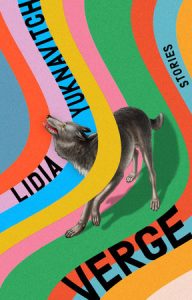
4. Verge by Lidia Yuknavitch
(Riverhead)
12 Rave • 5 Positive • 1 Mixed
Read a story from Verge here
“With the powers of her prose on full, incandescent display, 6½ pages is all Yuknavitch needs to illuminate the connections between the body and the spirit, the fists and the heart, both beating in their losing battles … In these 20 efficient and affecting stories, Yuknavitch unveils the hidden worlds, layered under the one we know, that can be accessed only via trauma, displacement and pain. There is a vein of the wisdom of the grotesque throughout … the damaged beauty of these misfits keeps the reader leaning in.”
–Nicholas Mancusi (TIME)
5. Sorry For Your Trouble by Richard Ford
(Ecco)
11 Rave • 4 Positive • 3 Mixed
“The finest and most substantial story here is ‘The Run of Yourself.’ One could say is has the richness and breadth of a novel, but that would be to slight the short-story form, of which Mr. Ford has repeatedly proved himself a master … However understated and oblique, Sorry for Your Trouble—which is what Irish people say to the bereaved at a funeral—is both a coherent work of art and a subtle and convincing portrait of contemporary American life among the moneyed middle class. None of the main characters has to worry about money, which highlights the emotional malaise that underlies their lives and their frequent and almost absent-minded couplings and uncouplings. In the background are wars, financial crises, natural vicissitudes. This is America, and Richard Ford is its chronicler. In these superbly wrought tales he catches, with exquisite precision…the irresistible melancholy that is the mark of American life.”
–John Banville (The Wall Street Journal)
6. Daddy by Emma Cline
(Random House)
9 Rave • 8 Positive
Read Emma Cline on Anaïs Nin’s erotic fiction and John Cheever’s journals here
“In an era whose ascendant short-story practitioners lean into high-concept experiments of genre and form, Emma Cline represents something of a throwback. The 10 stories that constitute her first collection, Daddy, are almost classical in structure—you won’t find a fragmentary collage, list or screenplay among them. Though she’s not one for a sudden, curious departure of voice or dissolution of the fourth wall, Cline has an unnerving narrative proprioception, and her stories have the clean, bright lines of modernist architecture … As for her style, she seems to eschew the telegraphic mode made popular by writers like Sally Rooney or Rachel Cusk for something at once direct and musical. Cline’s idiom is earnestness punctuated by millennial cool—but nothing too fussy, everything in just the right place … The aesthetic pleasure of Cline’s writing is anesthetizing. So much so that one could conceivably read these stories with the same drugged passivity with which one shuffles through a lifestyle catalog. But that would be a mistake … Cline is an astonishingly gifted stylist, but it is her piercing understanding of modern humiliation that makes these stories vibrate with life … the characters shift uncomfortably through the beautifully appointed shoe box dioramas of their lives, aware at once of their own insignificance and also of their desire for prominence. They ask if anything matters as though nothing does, and yet hope to be contradicted. But perhaps we all do. Perhaps, in these brilliant stories, that is the most daring and human thing of all.”
–Brandon Taylor (The New York Times Book Review)
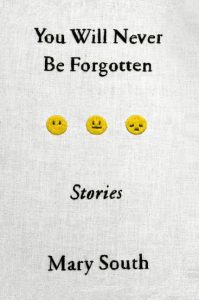
7. You Will Never Be Forgotten by Mary South
(FSG Originals)
9 Rave • 6 Positive • 1 Mixed
Listen to an interview with Mary South here
“South writes as though she has always been where we find ourselves now: looking back on a world where we believed we might gain personal agency over technology’s dominion, entering one where such agency is a luxury we might never again hope to afford … stories of exceptional loss, spilling out at the point of conflict between the cool detachment of the technological world and the tender vulnerability of the users living within it … This collection’s power, though, comes from South’s dark sensibility, her comfort with brutality, and her narrative insistence that, while the nightmare of tech capitalism won’t wholly eradicate the personal and the private, it will compress beyond recognition the spaces where personal, private moments can unfold … South writes with the assurance of someone who knows she has no answers to give. But instead of resulting in a shrugging ambivalence, You Will Never Be Forgotten mounts an ever more effective critique of technology-amplified structural inequality … [the] stories are united by South’s keen examination of the thrill and risk of human connection—between lovers, siblings, parent and child, care-giver and care-receiver, and digitally connected strangers—under increasingly cruel conditions … Still, You Will Never Be Forgotten shows us there is still tenderness to be found, and protected, in the brave new world to come.”
–Jennifer Schaffer (The Nation)
8. If It Bleeds by Stephen King
(Scribner)
6 Rave • 10 Positive • 1 Mixed
“Nobody does novellas like Stephen King … a quartet of stories that are a little too long to be labelled short, all of which are packed with that uniquely King combination of fear and empathy … One of the joys of King’s novella collections is the reminder that he, perhaps more than any of his bestselling peers, has a tremendous gift for giving stories exactly the amount of space they need to be properly told. Sometimes, that results in 700-plus page epics. Other times, just 70. Whatever it takes to get the story from his head to the page—that’s what King gives you. It’s remarkable really, that an author can create stories that cause a reader to shiver, to smile and to shed a tear in the space of a few pages—but really, should anything Stephen King does surprise us anymore? … practically pulses with the humanistic empathy that marks the best of King’s work. It’s an outstanding quartet, featuring four tales that are wildly different from one another, yet undeniably bound together by the voice of our finest storyteller. There is much to fear in the worlds created by Stephen King, but even in the depth of his darkest shadows, a light of hope steadily glows. More exceptional work from the maestro … Keep ‘em coming, Mr. King.”
–Allen Adams (The Maine Edge)
9. Show Them a Good Time by Nicole Flattery
(Bloomsbury)
7 Rave • 7 Positive • 2 Mixed
“Nicole Flattery’s publisher paid big money for these debut stories (plus a novel-in-progress), and it’s not hard to see why: they’re often extremely funny—peculiar as well as ha-ha—and highly addictive … Flattery’s themes are work, womanhood and early-to-midlife indirection, all tackled slantwise … It’s easy to read but trickier to get a handle on: Flattery’s off-kilter voice blends chatty candour and hard-to-interpret allegory (think Diane Williams or 90s Lorrie Moore), with the deadpan drollery and casually disturbing revelations heightened by her fondness for cutting any obvious connective tissue between sentences … Trauma lurks in the background, with allusions to attempted suicide, abuse and a 13-year-old’s miscarriage … Yet Flattery’s stories don’t depend on bringing such things to light; they’re just there—part of a woman’s life—which ultimately proves more disconcerting … Flattery…doesn’t seem too bothered about sewn-up narratives running from A to B; it’s a mark of her art in these strange, darkly funny stories that we aren’t either.”
–Anthony Cummins (The Guardian)
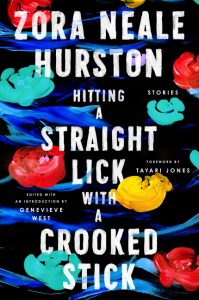
10. Hitting a Straight Lick With a Crooked Stick by Zora Neale Hurston
(Amistad)
7 Rave • 4 Positive
Read a story from Hitting a Straight Lick With a Crooked Stick here
“..a revelation not just in its celebration of Hurston’s lesser-known efforts as a writer of short stories but also in the subjects and settings that it takes on … Hurston’s stories do not merely document black experience in the early 20th century; they testify to larger truths about black life … tender and wry … Fans and scholars of Hurston’s work and the uninitiated alike will find many delights in these complex, thoughtful and wickedly funny portraits of black lives and communities … this book is a significant testament to the enduring resonance of black women’s writing.”
–Naomi Jackson (The Washington Post)
*
The Book Marks System:
RAVE = 5 points • POSITIVE = 3 points • MIXED = 1 point • PAN = -5 points
Book Marks
Visit Book Marks, Lit Hub's home for book reviews, at https://bookmarks.reviews/ or on social media at @bookmarksreads.










